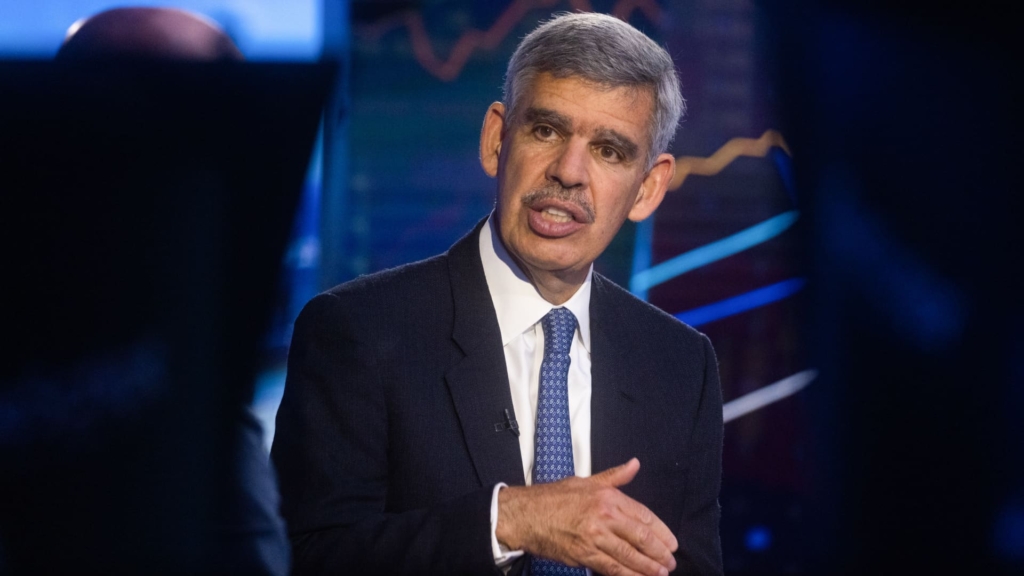Allianz SE’s Chief Economic Advisor, Mohamed El-Erian, cautioned on Friday that the extensive import tariffs enacted by President Donald Trump are placing the U.S. economy at an increased risk of recession.
He explained that these reciprocal tariffs could have far-reaching consequences for the global economy.
During an interview with Finance Newso’s Silvia Amaro at the Ambrosetti Forum in Cernobbio, Italy, El-Erian stated, “You’ve had a major repricing of growth prospects, with a recession in the U.S. going up to 50% probability, and you’ve seen an increase in inflation expectations, up to 3.5%.”
He emphasized that while a U.S. recession is not a certainty, the associated risks have become significantly elevated due to current economic conditions.
El-Erian pointed to signs of weakness emerging in the American economy, noting that recent surveys among fund managers and analysts suggested a perceivable slowdown, with recession fears reaching their highest level in six months.
He predicted that the U.S. economy would expand by only 1% to 1.5% this year, attributing this to a “significant change in the growth outlook” compared to earlier projections by the IMF, which had anticipated a growth rate of 2.7%.
“If we get close to 1%, we get close to what’s known as ‘stall speed,'” he warned. He further elaborated that an economy growing at such a slow pace would struggle to make the necessary resource reallocations, consequently heightening the risk of recession.
In addition to his warnings regarding the U.S. economy’s health, El-Erian highlighted that markets may be underestimating the inflationary impacts resulting from the current tariff regime.
He expressed concern about how the market’s initial reaction has primarily focused on growth, overlooking the potential implications for international economies and the resulting effects on the dollar’s value and Federal Reserve policy.
Recent data from the U.S. indicated that core inflation exceeded expectations, with the core personal consumption expenditures index—used by the Fed as a key inflation measure—recording its most substantial monthly increase in over a year.
El-Erian remarked, “I think if we’re lucky we’ll get one rate cut, not four, and it wouldn’t surprise me if we get none,” signaling doubt regarding the Federal Reserve’s readiness to make significant cuts this year.
“If it’s a normal Fed — and I say this qualification with a lot of emphasis, because this has not been a normal Fed — we would likely not see even one rate cut,” he added.
Markets are currently anticipating that the Fed will implement four rate cuts in the coming year, according to the CME Group’s FedWatch tracker. The central bank maintained its key rate between 4.25% to 4.5% during its last meeting in March but downgraded its U.S. growth forecast while still expecting to introduce two rate cuts through 2025.
‘If the U.S. slows down, the rest of the world will slow down more’
Following the announcement of Trump’s reciprocal tariffs, European currencies experienced significant appreciation against the U.S. dollar, with both the euro and the British pound reaching six-month highs against the greenback.
However, El-Erian indicated that he does not foresee a prolonged period of dollar weakness.
“The market has reacted to lower U.S. growth, lower interest rates, and reduced capital flows into the U.S., which has led to a decline in the dollar index,” he said. “I think this is just the first phase. People will realize that if the U.S. slows down, the rest of the world will slow down even more than the U.S., so I don’t believe we’ll see continued dollar weakness.”
Ultimately, El-Erian noted that economists remain divided on the long-term implications of the steep import duties for both the U.S. and global economies.
“While there is broad agreement on the short-term pain caused by tariffs, there is significant disagreement regarding potential long-term gains,” he explained. “Can you argue that this is short-term pain for long-term gain? Yes. Can you do so with conviction? No.”
— Finance Newso’s Jeff Cox and Steve Liesman contributed to this report.


























